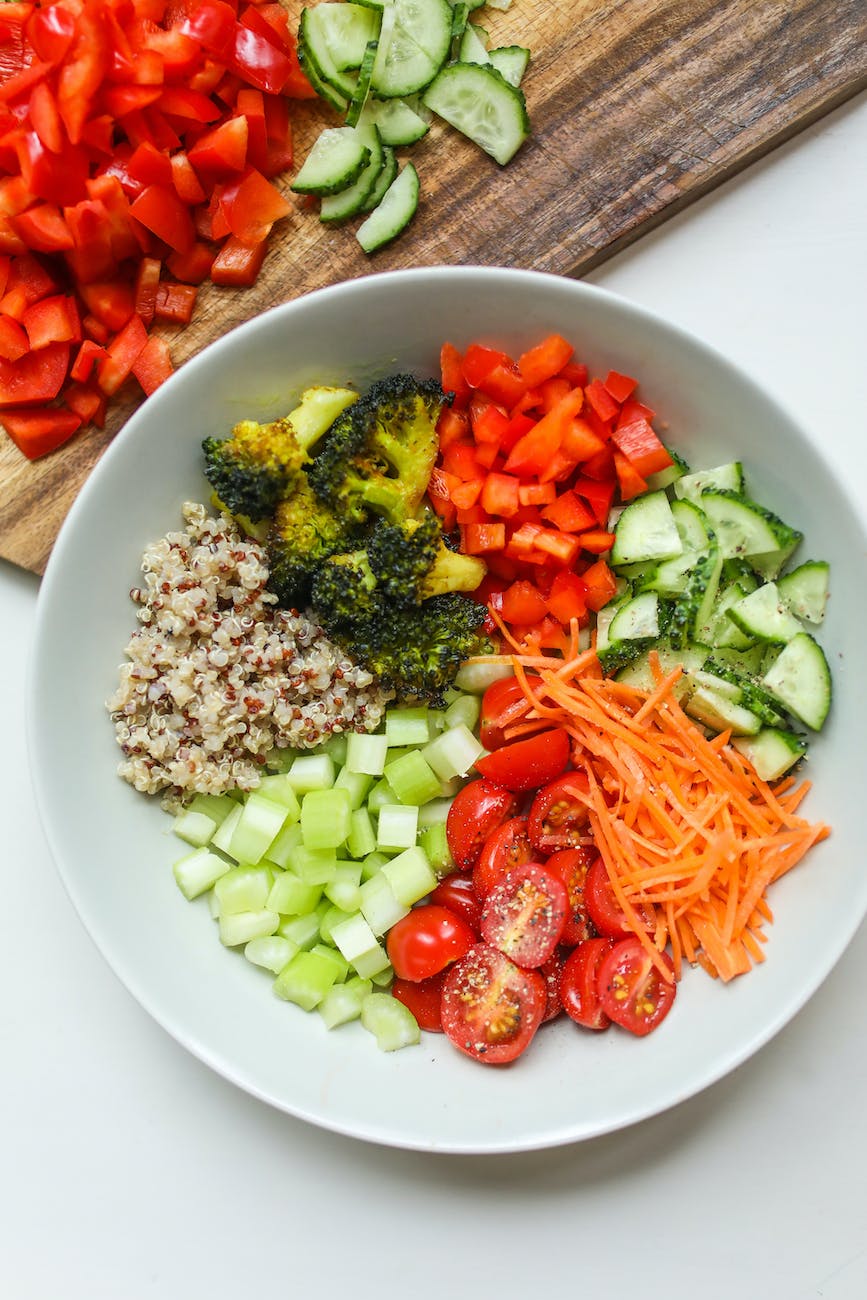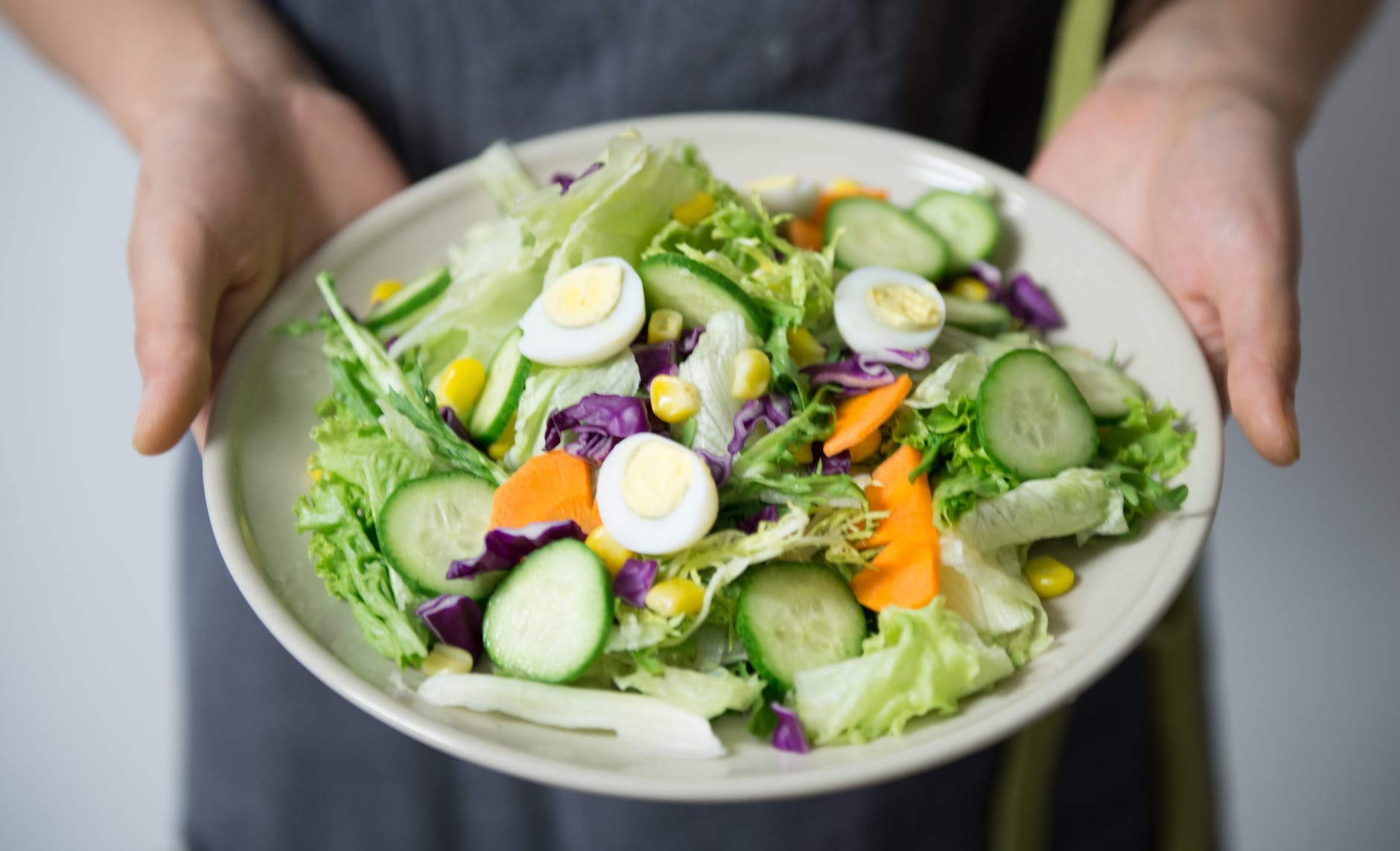Welcome to our blog post on creating a healthy diet plan for 7 days. We all know the importance of maintaining a balanced weekly meal plan for overall health and well-being. However, with our busy schedules, it can be challenging to plan and prepare healthy meals every day. That’s why we have put together this 7-day meal guide to help you stay on track with your healthy eating goals. With delicious and nutritious recipes, this plan will make it easier for you to stick to a healthy diet for the next week. Let’s dive in and learn how to nourish our bodies with a balanced and healthy diet plan for 7 days.
Understanding the Basics of a Healthy Diet
Eating a healthy diet is key to maintaining good health and overall well-being. Understanding the basics of a healthy diet is essential in order to make informed food choices and create a sustainable meal plan. In this section, we will explore the fundamentals of a healthy diet and how it can benefit your body.

A healthy diet consists of a variety of nutrient-rich foods that provide essential vitamins, minerals, and antioxidants. It should include a balance of carbohydrates, proteins, and healthy fats, as well as an abundance of fruits and vegetables. By incorporating these elements into your meals, you can ensure that your body is receiving the necessary nutrients to function optimally.
When creating a healthy meal plan, it is important to consider your specific dietary needs and goals. For example, if you are looking to lose weight, you may want to focus on portion control and include more high-protein foods in your diet. On the other hand, if you follow a plant-based diet, you can find healthy recipes that are rich in plant proteins, such as legumes, tofu, and tempeh.
Another important aspect of a healthy diet is to choose whole foods over processed ones. Whole foods, such as fruits, vegetables, whole grains, and lean proteins, are minimally processed and retain their natural nutrients. By opting for whole foods, you can avoid added sugars, unhealthy fats, and artificial ingredients that are commonly found in processed foods.
Incorporating quick and healthy meals into your weekly menu is a great way to stay on track with your healthy eating goals. Consider preparing meals in advance and having nutritious snacks on hand to avoid reaching for unhealthy options when hunger strikes. Experiment with different flavours and cooking techniques to keep your meals interesting and enjoyable.
What You’ll Need for Your 7-Day Meal Plan
When it comes to creating a healthy 7-day meal plan, preparation is key. Having the right ingredients on hand will make it much easier for you to stick to your healthy eating goals. So, what exactly will you need for your 7-day meal plan?
First and foremost, you’ll want to stock up on a variety of fresh fruits and vegetables. These will serve as the foundation of your meals, providing you with a wide range of essential vitamins and minerals. Choose a colourful assortment, including leafy greens, vibrant berries, and crisp bell peppers. Not only will these add flavour and nutrition to your dishes, but they’ll also keep your taste buds excited throughout the week.
Next, make sure you have a good selection of lean proteins. Whether you’re a meat-eater, vegetarian, or vegan, there are plenty of options to choose from. If you consume meat, opt for lean cuts like chicken breast, turkey, or fish. If you follow a plant-based diet, consider incorporating tofu, tempeh, or legumes into your meals. These plant proteins are not only packed with nutrients but also add a delicious and satisfying element to your dishes.
Don’t forget about healthy fats! Avocados, nuts, and seeds are all great sources of monounsaturated and polyunsaturated fats that are essential for your body’s health. Incorporating these fats into your meals can help to keep you feeling full and satisfied. Plus, they add a wonderful creaminess and crunch to your dishes.
Whole grains are another important component of a healthy diet. Brown rice, quinoa, oats, and wholemeal bread are all excellent options. These whole grains provide fibre and essential nutrients that can support digestion and help to maintain stable blood sugar levels.
Lastly, make sure to have a well-stocked spice rack. Herbs and spices can add depth and flavour to your meals without the need for excess salt, sugar, or unhealthy additives. Experiment with different combinations to find your favourite flavour profiles.
By having these ingredients on hand, you’ll be well-equipped to create a variety of delicious and nutritious meals throughout the week. Remember, a healthy diet plan is all about balance and moderation, so don’t be afraid to get creative and try new recipes. Your body will thank you for nourishing it with wholesome foods.
Creating a Healthy 7-Day Meal Plan
Now that you have a good understanding of the basics of a healthy diet and have stocked up on all the necessary ingredients, it’s time to create your 7-day meal plan. This is where you get to put your culinary skills to the test and come up with delicious and nutritious meals for the week ahead.
To start, consider your dietary goals and preferences. Are you looking to lose weight? Maybe you’re following a gluten-free or sugar-free diet? Whatever your needs may be, tailor your meal plan accordingly. For example, if you’re aiming for weight loss, focus on portion control and incorporate more high-protein meals into your plan. If you’re following a gluten-free diet, ensure that all the recipes you choose are free from gluten-containing ingredients.
Next, think about variety and balance. It’s important to include a mix of different food groups to ensure you’re getting all the necessary nutrients. Aim to have a balance of carbohydrates, proteins, and healthy fats in each meal. Don’t forget about fruit and vegetables – these should make up a significant portion of your meals.
When it comes to creating your meal plan, think about the meals you enjoy and try to incorporate them into your week. Consider dishes such as grilled chicken with roasted vegetables, quinoa salad with mixed greens and grilled tofu, or a stir-fry with brown rice and a variety of colourful vegetables. You can also explore new recipes and try out different cuisines to keep things interesting.
Plan your meals in advance and make a shopping list to ensure you have all the necessary ingredients. Prep some of the ingredients ahead of time, such as chopping vegetables or marinating meat, to save time during the week. If you find it challenging to cook every day, consider batch cooking and preparing larger quantities of certain meals that you can enjoy throughout the week.
Remember, a healthy meal plan is not just about what you eat, but also about how you eat. Take the time to sit down and enjoy your meals without distractions. Chew your food slowly and savour the flavours. This will not only help with digestion but also allow you to fully appreciate and enjoy your meals.
By creating a healthy 7-day meal plan, you’re setting yourself up for success. You’ll have a clear roadmap of what to eat each day, making it easier to stick to your healthy eating goals. So go ahead and start planning your Whole Foods Weekly Menu, Gluten-Free Weekly Menu, or Weight Loss Meal Plan.
Keeping Hydration in Check
Staying hydrated is an important part of maintaining a healthy diet plan. Water is essential for our bodies to function properly and helps with digestion, nutrient absorption, and toxin elimination. It is recommended to drink at least 8 glasses of water a day, but this can vary depending on factors such as age, weight, and activity level.
To keep hydration in check, it’s important to make water your beverage of choice throughout the day. Whilst it can be tempting to reach for sugary drinks or caffeinated beverages, they can actually dehydrate you and provide unnecessary calories. Opt for water instead, and if you’re looking for a little flavour, try adding slices of lemon, cucumber, or mint. healthy diet plan 7 days
In addition to water, incorporating hydrating foods into your meals can also help to maintain hydration levels. Fruits and vegetables with high water content, such as watermelon, cucumbers, strawberries, and oranges, are not only refreshing but also provide a good source of hydration. Include these in your snacks or meals to help stay hydrated throughout the day.
During your Fitness and Nutrition week, it’s important to be mindful of your water intake, especially if you’re engaging in physical activity. Sweating during exercise causes fluid loss, so it’s important to drink water before, during, and after your workout. You may also consider incorporating a sports drink or electrolyte-rich beverages if you engage in intense exercise or workouts lasting longer than an hour. healthy diet plan 7 days
It’s also worth noting that certain factors, such as hot weather or high altitude, can increase your body’s need for hydration. If you live in a hot climate or plan to spend time outdoors, it’s important to increase your water intake to compensate for the extra fluid loss through sweat.
Remember, staying hydrated is an important part of maintaining a healthy lifestyle. By making water your go-to beverage, incorporating hydrating foods into your meals, and being mindful of your fluid intake during physical activity, you can keep hydration in check and support your overall health and well-being. Cheers to a week of healthy hydration during your Fitness and Nutrition week!
Portion Control is Key
Portion control is a crucial aspect of maintaining a healthy diet plan. It’s all about balancing the amount of food you eat to ensure that you’re not overeating or consuming too few calories. By practising portion control, you can prevent weight gain, manage your energy levels, and support overall health.
One of the key benefits of portion control is that it helps you maintain a healthy weight. When we consume more calories than our bodies need, the excess is stored as fat, leading to weight gain. By being mindful of the portions we eat, we can prevent this calorie surplus and maintain a healthy weight.
To practise portion control, it’s important to be aware of serving sizes. Many of us tend to underestimate the amount of food we eat, leading to overeating. Use measuring cups or a kitchen scale to accurately measure your portions until you develop an intuitive sense of portion sizes.
When creating your 7-day meal plan, include a variety of high-protein meal ideas. Protein is an essential nutrient that plays a vital role in building and repairing tissues, supporting immune function, and keeping us feeling full and satisfied. Opt for lean sources of protein such as chicken breast, fish, tofu, or legumes.
In addition to protein, incorporate plenty of fruits and vegetables into your meals. These low-calorie, high-nutrient foods will help you feel satisfied while adding important vitamins and minerals to your diet. Fill half of your plate with colourful vegetables, and enjoy a piece of fruit as a snack or dessert.
It’s also important to pay attention to your body’s hunger and fullness cues. Eat slowly and mindfully, allowing yourself to fully enjoy your food. This will give your brain time to register when you’re satisfied, preventing overeating.
Lastly, don’t fall for quick-fix diets or detoxifying diet plans that promise rapid weight loss through severe calorie restriction. These types of diets are not sustainable and often lead to nutrient deficiencies and rebound weight gain. Instead, focus on creating a well-balanced meal plan that includes a variety of nutrient-rich foods in appropriate portions.
By practising portion control and including a variety of nutritious foods in your 7-day meal plan, you’ll be on track to achieving your health and wellness goals. Remember, it’s not just about what you eat, but also how much you eat. With a little planning and mindfulness, you can create a healthy and sustainable diet that nourishes your body and supports your overall well-being.
Importance of Regular Physical Activity : Healthy diet plan 7 days
Regular physical activity is a crucial component of a healthy diet plan. It goes hand in hand with proper nutrition to support overall health and well-being. Incorporating exercise into your daily routine has numerous benefits for both your body and mind.
One of the key advantages of regular physical activity is weight management. Engaging in activities that get your heart rate up and burn calories can help you maintain a healthy weight or even lose weight if that is your goal. Exercise increases your metabolism, allowing you to burn more calories throughout the day. It also helps to build lean muscle, which further boosts your metabolic rate. By combining regular exercise with a healthy diet, you can achieve sustainable weight loss and improve your body composition.
Physical activity is also essential for maintaining strong bones and muscles. Weight-bearing exercises, such as walking, jogging, and strength training, stimulate bone formation and increase bone density, reducing the risk of osteoporosis and fractures. Strengthening exercises, like resistance training, help to build and maintain muscle mass, which is crucial for maintaining a healthy metabolism and functional independence as you age.
In addition to the physical benefits, regular exercise has a positive impact on mental health. Physical activity releases endorphins, often referred to as the “feel-good” hormones, which can boost your mood and reduce symptoms of anxiety and depression. It can also improve sleep quality, increase energy levels, and enhance cognitive function.
Incorporating physical activity into your daily routine doesn’t have to be complicated or time-consuming. It can be as simple as taking a brisk walk, riding a bike, or doing a home workout. Aim for at least 150 minutes of moderate-intensity aerobic activity or 75 minutes of vigorous-intensity activity per week, along with muscle-strengthening activities on two or more days. Find activities that you enjoy and make them a regular part of your routine.
Remember, physical activity is not just about the short-term benefits. It is a lifelong commitment to your health and well-being. By staying active, you can reduce the risk of chronic diseases, improve your overall quality of life, and set a positive example for others. So, lace up those trainers, grab a friend or family member, and start moving towards a healthier and happier you.
Maintaining a healthy diet plan for 7 days is a great way to kickstart your journey towards better health and wellbeing. But the key to long-term success is making your healthy diet plan sustainable. It’s not about a quick fix or a short-term solution. Instead, it’s about creating healthy habits that you can maintain for the long haul.
Here are some tips to help you make your 7 days healthy diet plan sustainable:
1. Start small and gradually make changes: Instead of completely overhauling your diet overnight, focus on making small changes that you can stick to. For example, start by incorporating more fruits and vegetables into your meals, then gradually reduce your intake of processed foods and unhealthy snacks. Taking small steps allows you to adjust to the changes without feeling overwhelmed.
2. Find healthy alternatives to your favourite foods: We all have foods that we love, but they may not always be the healthiest choices. Instead of completely eliminating them from your diet, look for healthier alternatives. For example, if you love pasta, try swapping regular pasta for wholemeal or chickpea pasta. This way, you can still enjoy your favourite foods while nourishing your body with more nutritious options.
3. Plan your meals and prep in advance: One of the biggest challenges in maintaining a healthy diet is finding the time to prepare meals. To make it easier, set aside some time each week to plan your meals and prep ingredients in advance. This can include chopping vegetables, marinating proteins, or cooking large batches of healthy meals that you can enjoy throughout the week. Having healthy meals ready to go will make it easier to stick to your plan, even on busy days.
4. Seek support from family and friends: Trying to make changes to your diet on your own can be difficult. Seek support from your family and friends by sharing your goals and asking for their help. They can provide accountability, join you in healthy activities, and offer encouragement when you need it most. Plus, sharing your journey with others can make it more enjoyable and less daunting.
5. Be kind to yourself and allow for flexibility: It’s important to remember that maintaining a healthy diet is not about being perfect all the time. There may be days when you indulge in a treat or eat something that isn’t considered “healthy”. That’s okay! Allow yourself some flexibility and remember that it’s the overall pattern of your eating habits that matters. Be kind to yourself and don’t beat yourself up over small slip-ups.


